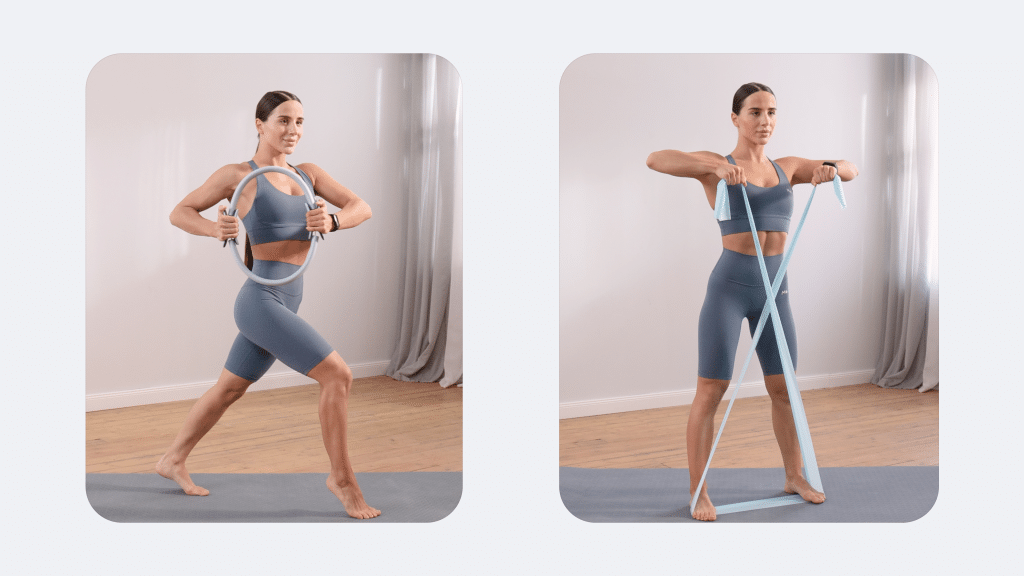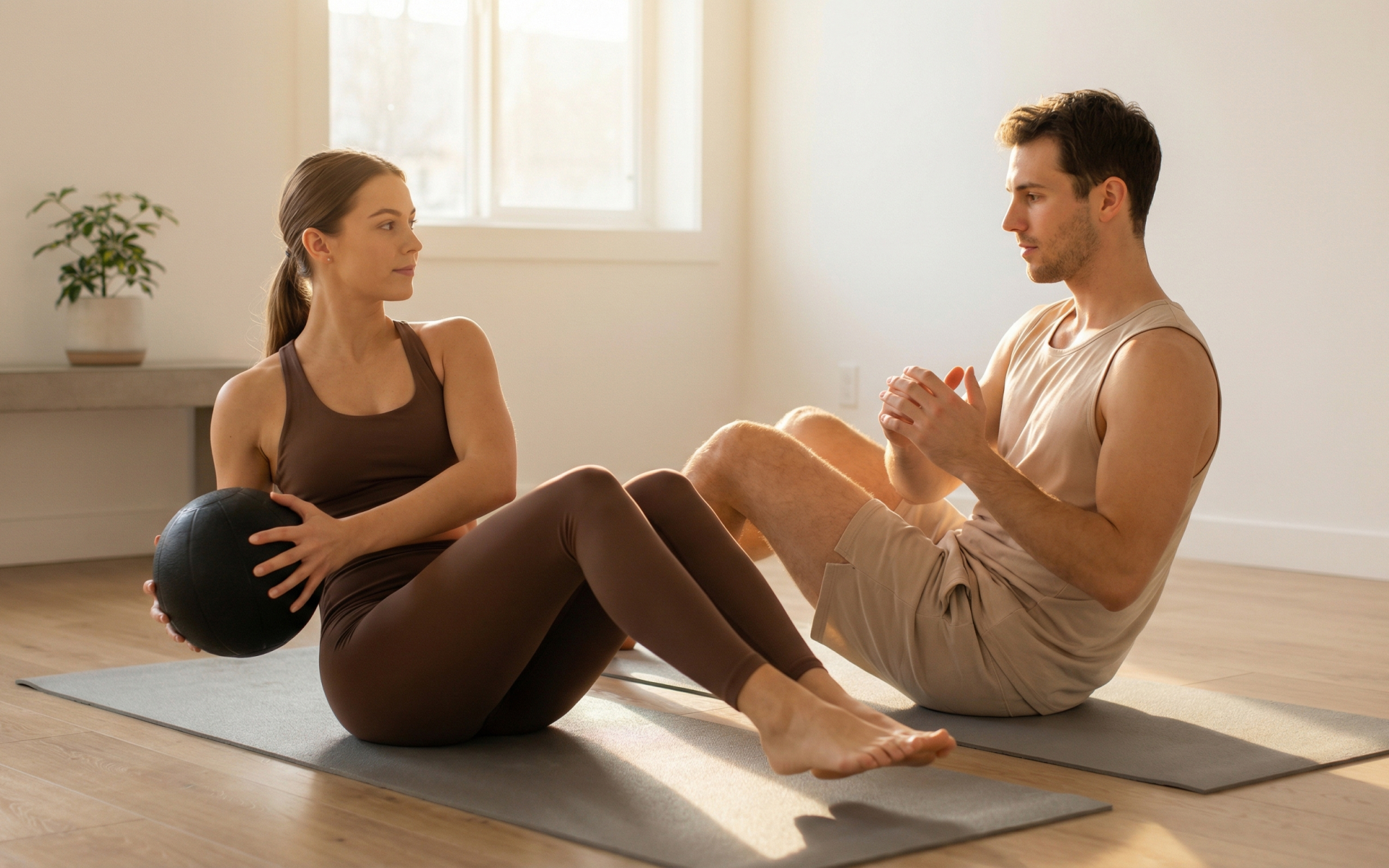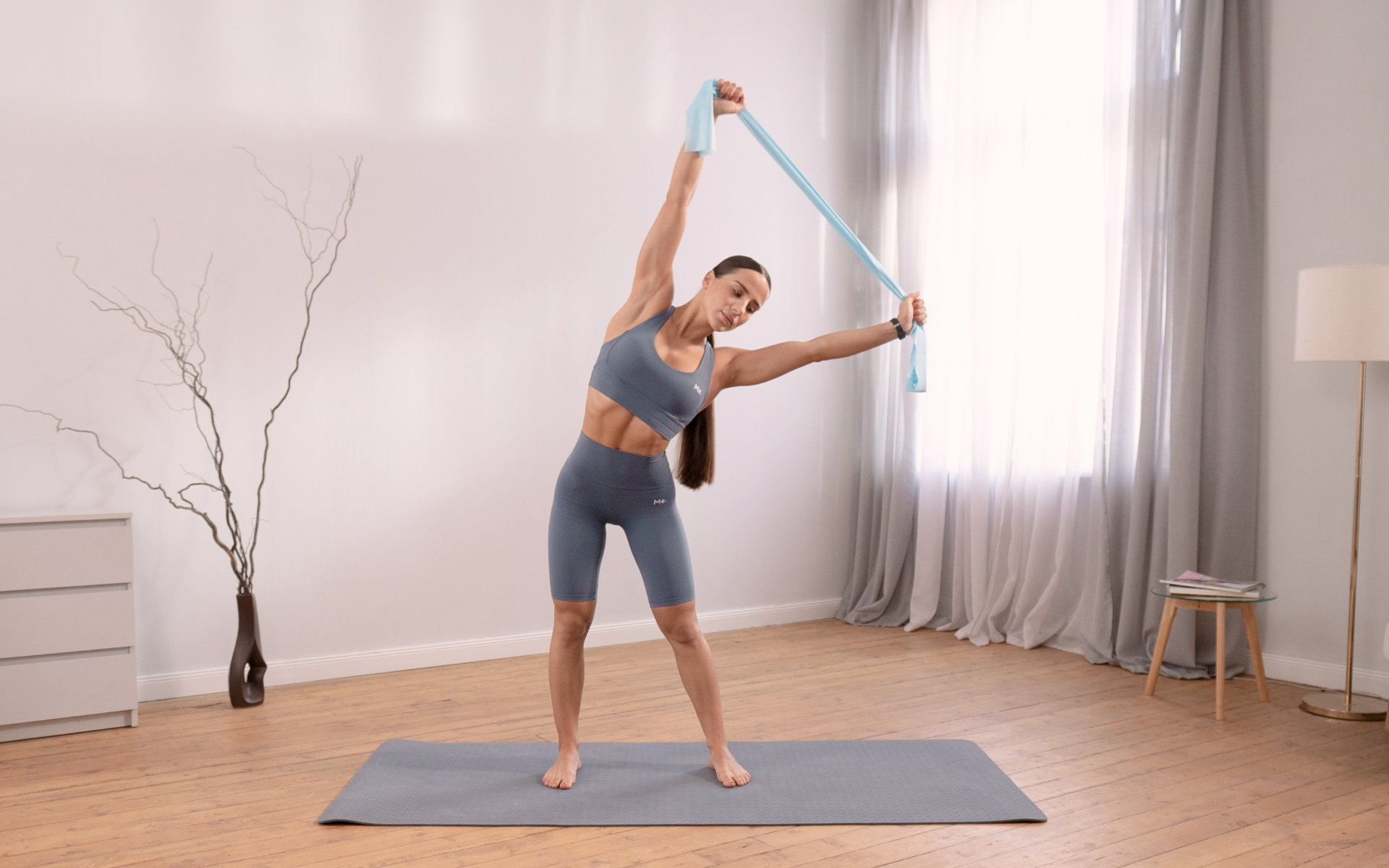When people want to start working out, one of the most common questions they ask themselves is how often they should work out. While we may all want a quick answer to this, the simple truth is that there’s no clear-cut answer to this question for many reasons.
Factors such as an individual’s ability, the fact that people have different fitness goals, workout routines, different amounts of time to work out, and so on all play a part in determining this.
With that being said, is working out 6 days a week too much? Does working out 6 days a week guarantee weight loss? Is a longer workout routine of exercising 6 days a week better than a shorter one of 3 days a week? Read on to find out.
Is Working Out 6 Days a Week Too Much?
Working out 6 days a week is not necessarily too much for an avid exerciser, but it may not be the safest option for beginners. We all know that working out has many benefits. Exercising can help with (7, 6):
- Weight loss
- Building strength and muscle mass
- Reducing the risk of various cardiovascular conditions such as heart attacks
- Reducing the risk of chronic illnesses such as diabetes mellitus, colon and breast cancer, obesity, hypertension, bone and joint diseases such as osteoporosis and osteoarthritis, as well as depression
- Improving overall mood as it releases feel-good hormones
- Improving quality of life and daily living
Although working out comes with some incredible benefits, working out too hard and too much may cause more harm than good. As with many things in this world, moderation is the key.
You don’t want to do so little that you don’t get any results from training, but you also don’t want to do so much that you end up causing harm to yourself. From the physical activity guidelines provided by the Centers for Disease Control and Prevention depending on the kind of workout you do and its intensity, exercising two to five days a week is generally advised (8).
Intense sweat sessions, working weight loss tips, lip-smacking recipes come in one package with the BetterMe app. And all of it is at your fingertips, start transforming your life now!
Is Working Out 6 Days a Week Overtraining?
This generally depends on the person and situation.
Overtraining is a condition where a person exceeds their body’s ability to recover from strenuous exercise. This generally happens if you don’t give your body ample time to rest and recover after a workout. It is a sort of muscular, mental, and even physical ‘burnout’ that occurs when you overdo exercise (13).
For people who are intermediate or advanced at exercising, their bodies are used to the strain of exercise and so working out harder and longer is generally okay for them and their bodies.
However, for beginners, your body is new to exercise and is not used to the strain. This means it takes longer for the muscles to repair and recover from working out. You need to rest longer for your body to fully recover and resting for just 24 hours isn’t enough.
If you want to know if training 6 days a week is making your body experience overtraining, here are some symptoms to look out for:
Extreme and prolonged soreness
Most of the time, being sore after a training session is considered a good thing. Many people believe that this means you’re really giving your all when working out and that you’re really getting the most out of your exercises, but this isn’t always the case.
Being just a bit sore is okay, and the feeling generally tends to go away in one to two days. However, if you’re still sore after the 48-hour mark, this could be a sign that you’re working out too hard and need to reduce the intensity (13).
Another indicator in terms of soreness is its intensity. Normal soreness after exercising means that although your body and muscles hurt you’re still able to walk, work, and perform other everyday activities. It hurts, it’s uncomfortable, but you’re in no way incapacitated.
The problem arises if you’re too sore to even sit down, walk properly, or even move slightly. This is your body’s way of saying you’re doing too much. When you’re training, it’s always advisable to listen to your body as it knows best.
Soreness from overtraining doesn’t always affect the entire body. If you feel sore/pain on just one side of your body or in one muscle group, then this is also proof that you’ve overworked that particular part of your body.
Remember that overtraining or overworking one or multiple parts of your body increases the likelihood of injury while exercising or out in the world while performing normal activities. The strain, pressure, and tension tend to weaken the body and muscles in some way.
An overwhelming desire to workout
Exercise has numerous benefits and moving your body for at least 30 minutes a day is recommended for better overall health and even weight loss. Being able to say no to some activities just so you don’t miss out on a scheduled workout is considered commendable and a healthy habit. It shows dedication not only in fitness, but also in life.
However, if you find yourself always thinking about your next workout, canceling important things so you can exercise, or ignoring family or work obligations to get a workout in, then it may be time to reconsider. If you also find yourself spending hours on end working out, then you could be pushing yourself too far.
Remember while it’s important, exercise should be done in moderation. Ignoring everything else so you can exercise or spending all your time working out is not good for you.
If you notice such a pattern happening in your life, take a step back and allow your body to recover, and direct your mind elsewhere.
Irregular periods or complete loss of period cycle
There are multiple reasons why someone who has a regular menstrual cycle may suddenly experience irregular periods or lose their periods completely. Irregular, missed, or late periods could be due to factors including (11, 19):
- Pregnancy
- Cushing’s syndrome
- PCOS or POI
- Sudden weight loss
- Hormonal birth control
- Medication
- Excessive stress
- Being overweight
- Thyroid dysfunction
- Eating disorders
Excessive exercise is another reason why a girl or woman may end up missing their cycle. In an older study review published in 1990, it was found that menstrual dysfunction is more common in female athletes than women in the general population. These athletes are often diagnosed with oligomenorrhea, amenorrhea, or menarcheal delay (4).
In 2003, through the use of questionnaires given to freshman female cadets, researchers found that after a year of participating in training, only 1.7% of the women had regular cycles. The remaining 98.3% were all experiencing irregular cycles:
- 10.3% mildly
- 35.3% moderately
- 30.2% severely
- 22.4% extremely irregular (10)
Another study of 40 women enrolled in the Korea Third Military Academy found that after 8 weeks of participating in military training programs, women’s hormones changed with some increasing and others decreasing. Researchers suggested that this hormonal imbalance created by such a tough training system could be the root of menstrual irregularities (3).
If you’ve been working out a lot and notice that your period has completely gone or suddenly become irregular, don’t jump to conclusions and blame your exercise routine. Make sure you consult your doctor so you can eliminate all other possibilities.
Read more: Thigh Workout Guide: 7 Effective Exercises for Building Leg Strength
Irritability, mood swings, and other mental health problems
Exercising is known to improve your mood. People who are stressed are generally advised to work out as working out produces feel-good hormones, which makes their mood better (16, 15). However, exercising too much can have a negative impact on your mood. You may find yourself feeling more irritable, more easily agitated, more restless, and even more anxious (13). In more severe cases, pushing yourself and your body more than it can handle can lead to depression (14).
Reduced or loss of appetite
Increased appetite is an expected side effect of working out. As you’re expending so much energy, you get hungrier as a way of replenishing the energy lost when exercising. Eating a lot also helps provide your body with enough macronutrients to support healthy weight loss and muscle growth.
This is why athletes, bodybuilders, and those who work out often are known for eating so much. If you change your workout routine and realize that you’re eating less and have no appetite despite giving your all, this could be because you’re overtraining.
One study from 2017 found that athletes are under stress from excessive daily training and suffer hormonal changes, reduced immunity, and mood swings, but they also experience a loss of appetite. Researchers realized that the longer the subjects work out, the lower the levels of ghrelin – the hunger hormone – in their bodies (2).
Insomnia or disturbed sleep
If you find that you can no longer sleep through the night or at all, this could be because you’re overworking yourself (13, 1).
A study on the sleep patterns of athletes found that the more they worked out and pushed themselves, the less they were able to sleep. This led to the suggestion that sleep could represent a feasible indicator of determining overreaching/overtraining status. They also called for more research on the matter (1).
How Many Days a Week Should You Workout?
As mentioned earlier, there is no blanket answer to this question. Many factors influence this, but it all depends on the individual. The 2018 Physical Activity Guidelines for Americans recommends 150 minutes of moderately-intense aerobic activity or 75 minutes of vigorous-intense aerobic activity each week (8). It also recommends at least 2 days of strength training per week.
Looking at these 150 minutes per week, you can divide the time so you can be effective at the gym and at the same time get time to rest – this usually means working out 30 minutes a day for 5 days a week and resting on the other two days.
It should be noted that a person can do more than 150 minutes per week. The 150 minutes a week suggestion is okay for someone who is looking to lose weight and be averagely fit. However, if you have bigger fitness goals such as competing in a marathon, you’ll need to do more.
That being said, just because you have greater fitness goals, this doesn’t mean you should work out every day. As we’ve seen above, doing this is likely to cause more harm than good. Many people dismiss rest, but rest and recovery are incredibly important to an exercise routine.
Exercise damages muscles and they require days to recover and repair themselves (12). Training 6 days a week takes away rest time, which can lead to issues if you don’t prioritize your rest and nutrition.
Whether you’re looking to simply pep up your fitness routine, jazz up your diet with mouth-watering low-calorie recipes or want to get your act together and significantly drop that number on your scale – BetterMe app has got you covered! Improve your body and revamp your life with us!
Is Working Out 6 Days a Week Too Much? The Importance of Rest in a Workout Program
Here’s why you should incorporate rest into your workout plan:
Muscles Grow When You Rest
Constantly being at the gym lifting heavy weights won’t be effective without giving your body rest time. When you lift weights, you get tiny tears in your muscle fibers, which is why you feel sore after a workout.
Those muscle fibers can only repair when you’re resting and when you eat foods that help with muscle growth, such as protein (12). The process of repairing those muscle fibers is what makes you stronger than before. Without allowing your body to rest, the muscle fibers cannot repair and your muscles are not able to grow.
It’s important to know that this doesn’t only happen in strength training, as resting the muscles is also important even when doing cardiovascular exercises. An exercise like running will break down various fibers in the leg muscles, and rest will help increase your muscle endurance and strength.
Regarding how long a person should rest, you should rest until you aren’t sore anymore. This may take one to two days, but it is dependent on the intensity of your training. The harder you go at it, the more rest you will require. The harder you train, the more rest you will need.
Ways to Rest
- Active rest – If you don’t feel like being absolutely still or not moving your body in some way, you can participate in active rest. Active rest means doing a low-intensity activity, such as walking, stretching, or foam rolling. This allows you to keep up your fitness momentum and promote circulation, which equals better recovery for your muscles.
- Try a split training routine – This is an exercise regimen where you work out different muscle groups on different days of the week. For example, if you worked your upper body on Monday, you can work your lower body on Tuesday. This gives time for your upper-body muscles to recover while still being active.
Remember, even split training doesn’t include complete rest. You still need to find 24 to 48 hours of full rest to allow all the body’s muscles to recover
Rest Prevents Injury
When you over-exercise, you increase the risk of injury. This applies to all sorts of exercises, from cardio workouts to strength training exercises. Resting prevents overuse of muscles and joints.
If you work out every day, you’re constantly exerting pressure and stress on certain body parts, muscles, and joints. Not resting means you will continue exerting pressure on those limbs and muscles to the point where they can’t take it anymore and this will cause injuries.
Being injured means you can’t work out anymore until you heal, which ends up affecting all the progress you’ve already made. You end up taking more time off than you would have if you’d rested.
Increases Your Performance in the Gym
Most people don’t want to rest as they think this will make their progress or gym performance decline, but this isn’t true. It takes a couple of weeks of being inactive for a person to notice a decline in their progress.
A study review on athletes found that they typically start losing muscle mass after 3 weeks of not working out (17). If it takes 21 days for elite athletes to lose mass and progress, this means taking that one day off or two days won’t affect what you’ve been doing.
In any case, resting gives you time to re-energize and strategize so you can be a beast when you return to the gym. Resting also prevents you from getting burnout, and this is the last thing you need.
Rest Promotes Quality Sleep
Overtraining can have a serious impact on your sleep patterns. You may find yourself experiencing insomnia or other unhealthy sleep conditions. This is because overtraining leads to increased stress and anxiety, in addition to hormone disruptions. This even increases your heart’s resting rate.
Resting helps return hormones to homeostasis and takes your heart rate to normal levels, making it possible for you to enjoy a good night’s rest.
This proves that resting is just as important as training in a workout program. Just as there’s no exact answer regarding how many days you should work out in a week, there’s also no exact answer to how many days you should rest in a week. It comes down to the type of exercises you’re doing, the intensity of your exercises, your nutrition, what recovery modalities you participate in (such as sauna or stretching), how your body feels, and what health experts tell you to do.
6 Days a Week Workout Plan (Beginner-Friendly)
If you insist on exercising 6 days a week, here’s a simple routine you can do without the risk of overtraining. Please note that this routine is best for beginners and intermediate or advanced exercisers may not benefit from it.
- Monday – Walking. Can be done at a slow or brisk pace, outside or in the gym. Regardless of location or pace try walking for at least 30 minutes.
- Tuesday – Full body calisthenics. This is great for cardiovascular health and strength training. Exercises you can include in your routine include walking lunges, pushups, mountain climbers, squats, and burpees.
- Wednesday – Wall Pilates. Pilates is great for anyone who wants to increase their core strength and overall muscle tone. Try some wall Pilates in the comfort of your home.
- Thursday – Upper- and lower-body strength training. Overhead press, bicep curls, pullups, and farmers carry are great for upper-body workouts. Lower-body workouts include exercises such as deadlifts, box step-ups, reverse and forward lunges, and glute bridges.
- Friday – Swimming or any other water aerobics. If you can’t access a pool, running, jogging, and jumping rope will also suffice.
- Saturday – Active recovery – try foam rolling, tai chi, or some yoga.
- Sunday – Complete rest.
Read more: Your Flat Tummy Workouts Just Got Better With This Guide
FAQs
Should you work out 7 days a week without rest?
No, you shouldn’t. As explained above, exercising too much without rest leads to overtraining syndrome, a condition that affects you physically, emotionally, and mentally.
Is it better to work out 3 days a week or 6 days a week?
It all depends on your goals and how long you’ve been exercising.
For people who have been working out for a while – i.e. those at an advanced level, or those who engage in competitions that require immense feats of strength – a 6-day workout routine is better for them than a 3-day plan.
However, if you’re new to exercising, using a 3-day routine is much better for you than a 6-day plan. Remember, just because you’re mentally ready, this doesn’t mean that your body can keep up. The saying ‘mind over matter’ doesn’t always work in certain situations. As your body isn’t used to the strain of exercise, it requires more than a mere 24 hours of rest to recover and stop hurting.
Follow a 3 days a week routine for at least 2 months and then you may add an extra day to the routine.
How much is overtraining?
Again, this all depends on the person. We all have different levels of endurance and what may constitute my trigger for overtraining could just be another easy day for you. All we can say is, to be on the safe side and avoid any chances of this happening, make sure you:
- Always rest for a period of 24 to 48 hours a week. If you can even push it to 72 hours, that’s better. The hours don’t need to be consecutive. As long as you hit this goal, you’ll be okay.
- Mind the intensity of your workout – Intense workouts are great as they burn a lot of calories, which helps with weight loss and/or maintenance. Intense strength training or weightlifting is also better for muscle growth.
However, there’s always a limit. Working out for too long or too hard every session can lead to muscle damage. While regular exercise-induced muscle damage is good as it can lead to muscle hypertrophy (5), too much is bad and could lead to overtraining
Will I lose weight if I work out 6 days a week?
Yes, you can. But remember, you can also lose weight by reducing your calorie intake and only exercising 3 days a week. Before jumping at the idea of exercising 6 days a week, make sure your body is up to it. There’s no reward in pushing too much and far beyond what your body can handle.
How many days to break a habit?
Contrary to popular belief, it doesn’t take 21 days to break a habit or form a new positive one. It is said that it takes anything from 18 to 254 days to change your behavior – with an average of 66 days for the new behavior to become automatic (9, 18).
The Bottom Line: Is Working Out 6 Days a Week Too Much?
It can be, and it is for most of the population. Unless you’re an athlete who requires your body to be in tip-top shape for most or all of the year, there’s truly no need for you to exercise 6 days a week.
A routine where you exercise 3 to 5 days a week is enough for you to reach your goals – just make sure you eat right and practice progressive overload as a way to challenge your body.
Remember that even seasoned athletes have been shown to experience signs of overtraining due to their demanding training programs. This means that although they’ve built their bodies to withstand such stress, they aren’t exempt from the side effects.
To stay safe, leave such an extreme routine alone and stick to a 5-days-a-week workout routine.
DISCLAIMER:
This article is intended for general informational purposes only and does not serve to address individual circumstances. It is not a substitute for professional advice or help and should not be relied on for making any kind of decision-making. Any action taken as a direct or indirect result of the information in this article is entirely at your own risk and is your sole responsibility.
BetterMe, its content staff, and its medical advisors accept no responsibility for inaccuracies, errors, misstatements, inconsistencies, or omissions and specifically disclaim any liability, loss or risk, personal, professional or otherwise, which may be incurred as a consequence, directly or indirectly, of the use and/or application of any content.
You should always seek the advice of your physician or other qualified health provider with any questions you may have regarding a medical condition or your specific situation. Never disregard professional medical advice or delay seeking it because of BetterMe content. If you suspect or think you may have a medical emergency, call your doctor.
SOURCES:
- Can Sleep Be Used as an Indicator of Overreaching and Overtraining in Athletes? (2018, ncbi.nlm.nih.gov)
- Changes in Stress and Appetite Responses in Male Power-Trained Athletes during Intensive Training Camp (2017, ncbi.nlm.nih.gov)
- Effects of intensive training on menstrual function and certain serum hormones and peptides related to the female reproductive system (2017, ncbi.nlm.nih.gov)
- Evaluation and management of menstrual dysfunction in athletes (1990, pubmed.ncbi.nlm.nih.gov)
- Exercise-induced muscle damage: What is it, what causes it and what are the nutritional solutions? (2019, onlinelibrary.wiley.com)
- Health Benefits of Exercise (2018, ncbi.nlm.nih.gov)
- Health benefits of physical activity: the evidence (2006, ncbi.nlm.nih.gov)
- How much physical activity do adults need? (2022, cdc.gov)
- Making health habitual: the psychology of ‘habit-formation’ and general practice (2012, ncbi.nlm.nih.gov)
- Menstrual irregularity in female military cadets: comparison of data utilizing short-term and long-term recall (2003, pubmed.ncbi.nlm.nih.gov)
- Missed or late periods (2022, nhs.uk)
- Muscle Recovery and Nutrition (2022, ncbi.nlm.nih.gov)
- Overtraining Syndrome (2012, ncbi.nlm.nih.gov)
- Physiological and Psychological Effects of Treadmill Overtraining Implementation (2021, ncbi.nlm.nih.gov)
- Regular exercise is associated with emotional resilience to acute stress in healthy adults (2014, ncbi.nlm.nih.gov)
- Stress and Exercise (2014, apa.org)
- The development, retention and decay rates of strength and power in elite rugby union, rugby league and American football: a systematic review (2013, pubmed.ncbi.nlm.nih.gov)
- The Importance of Creating Habits and Routine (2019, ncbi.nlm.nih.gov)
- What causes menstrual irregularities? (2017, nichd.nih.gov)













